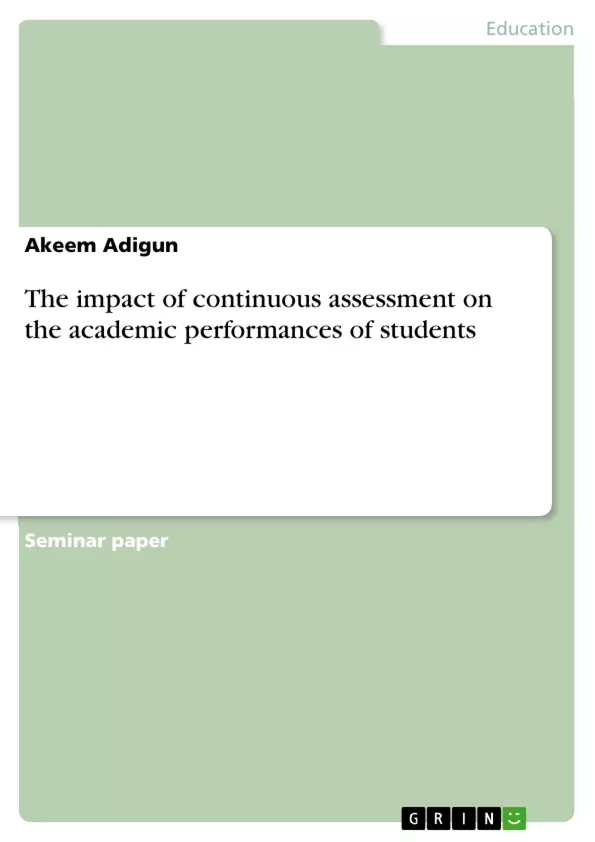This work explores the impact of continuous assessment on the academic performances of students with the help of a survey that questioned 120 secondary school teachers in Ilorin Metropolis.
Over the years, the practice of continuous assessment has been the pre-evaluation process of the academic success of students before their final examination period. Nowadays, however, it appears that teachers are not using continuous assessment to prepare students for examinations. In view of this, the study investigates the impact of continuous assessment regarding the academic performance of students.
The descriptive survey design was employed for the study and a random sampling technique was used to select 120 teachers in ten different secondary schools in Ilorin Metropolis. The instrument used was a self-designed questionnaire entitled "Impact of CA Academic Performance Questionnaire (ICAAPQ)". The study reveals that continuous assessment helps students to remember what has been learnt, to concentrate on difficult areas of a subject, and help to identify their areas of strengths and weaknesses.
The author recommends that teachers should work with school counsellors to critically examine students performances in continuous assessment in order to understand their areas of weaknesses.
Table of Contents
- Abstract
- 1. Introduction
- 2. Statement of the Problem
- 3. Research Questions
- 4. Research Hypotheses
- 5. Methodology
Objectives and Key Themes
This study investigates secondary school teachers' perceptions in Ilorin metropolis, Nigeria, regarding the impact of continuous assessment (CA) on students' academic performance. The research aims to understand the relevance of CA in students' academic success and explore whether perceptions differ based on teacher gender and educational qualifications.
- The impact of continuous assessment on student academic performance.
- Teacher perceptions of the effectiveness of continuous assessment.
- The relationship between teacher gender and their views on continuous assessment.
- The correlation between teacher educational qualifications and their views on continuous assessment.
- Implications for improving teaching and learning practices based on CA effectiveness.
Chapter Summaries
1. Introduction: This chapter introduces the crucial role of student assessment in the teaching and learning process, emphasizing its importance in providing feedback on educational goals. It defines continuous assessment (CA) as a periodic evaluation method used to monitor student progress and mastery of knowledge and skills. The chapter highlights the shift from summative assessment to a more comprehensive approach, incorporating CA to address identified deficiencies in the traditional system. The discussion touches upon the National Policy on Education in Nigeria and its emphasis on incorporating CA into the assessment process at all levels. The chapter sets the stage for investigating teachers' perceptions on the relevance of CA to students' academic performance.
2. Statement of the Problem: This section addresses the inconsistent academic performance of students in Nigeria's secondary schools, highlighting the variation in performance across schools. It questions the relationship between continuous assessment strategies used by teachers and student academic performance. The chapter points to a gap in existing research, specifically lacking studies focusing on teachers' perceptions of CA's relevance in Ilorin metropolis, thus justifying the current study's focus.
Keywords
Impact, Continuous Assessment, Students, Academic Performance, Secondary School, Teachers, Ilorin Metropolis, Nigeria, Teacher Perception, Educational Assessment, Qualitative Research.
Frequently Asked Questions: A Comprehensive Language Preview
What is the main topic of this research?
This research investigates secondary school teachers' perceptions in Ilorin metropolis, Nigeria, regarding the impact of continuous assessment (CA) on students' academic performance. It aims to understand the relevance of CA in students' academic success and explore whether perceptions differ based on teacher gender and educational qualifications.
What are the key themes explored in this study?
The study explores the impact of continuous assessment on student academic performance; teacher perceptions of CA's effectiveness; the relationship between teacher gender and their views on CA; the correlation between teacher educational qualifications and their views on CA; and implications for improving teaching and learning practices based on CA effectiveness.
What is the scope of the research?
The research focuses on secondary school teachers in Ilorin metropolis, Nigeria. It examines their perceptions of continuous assessment and its impact on student academic performance.
What methodology is used in this research?
While the specific methodology isn't detailed in this preview, the mention of "Qualitative Research" in the keywords suggests a qualitative approach is used.
What are the chapter summaries included in the preview?
The preview includes summaries of the Introduction and Statement of the Problem chapters. The Introduction sets the context by discussing the importance of assessment, defining continuous assessment, and highlighting the study's focus. The Statement of the Problem section addresses inconsistent academic performance in Nigerian secondary schools and the gap in research on teachers' perceptions of CA in Ilorin.
What are the objectives of the study?
The study aims to understand the impact of continuous assessment on student academic performance and to explore whether teacher perceptions of CA differ based on their gender and educational qualifications.
What are the key words associated with this research?
Key words include: Impact, Continuous Assessment, Students, Academic Performance, Secondary School, Teachers, Ilorin Metropolis, Nigeria, Teacher Perception, Educational Assessment, Qualitative Research.
What is continuous assessment (CA)?
The preview defines continuous assessment as a periodic evaluation method used to monitor student progress and mastery of knowledge and skills. It's presented as a shift from solely summative assessment towards a more comprehensive approach.
What is the significance of this research?
The research aims to contribute to a better understanding of the effectiveness of continuous assessment in improving student academic performance and to inform teaching and learning practices in Nigerian secondary schools.
Where can I find more information about this research?
This preview provides a summary; the full research paper would contain the complete details of the methodology, findings, and conclusions.
- Citar trabajo
- Akeem Adigun (Autor), 2016, The impact of continuous assessment on the academic performances of students, Múnich, GRIN Verlag, https://www.grin.com/document/491736



